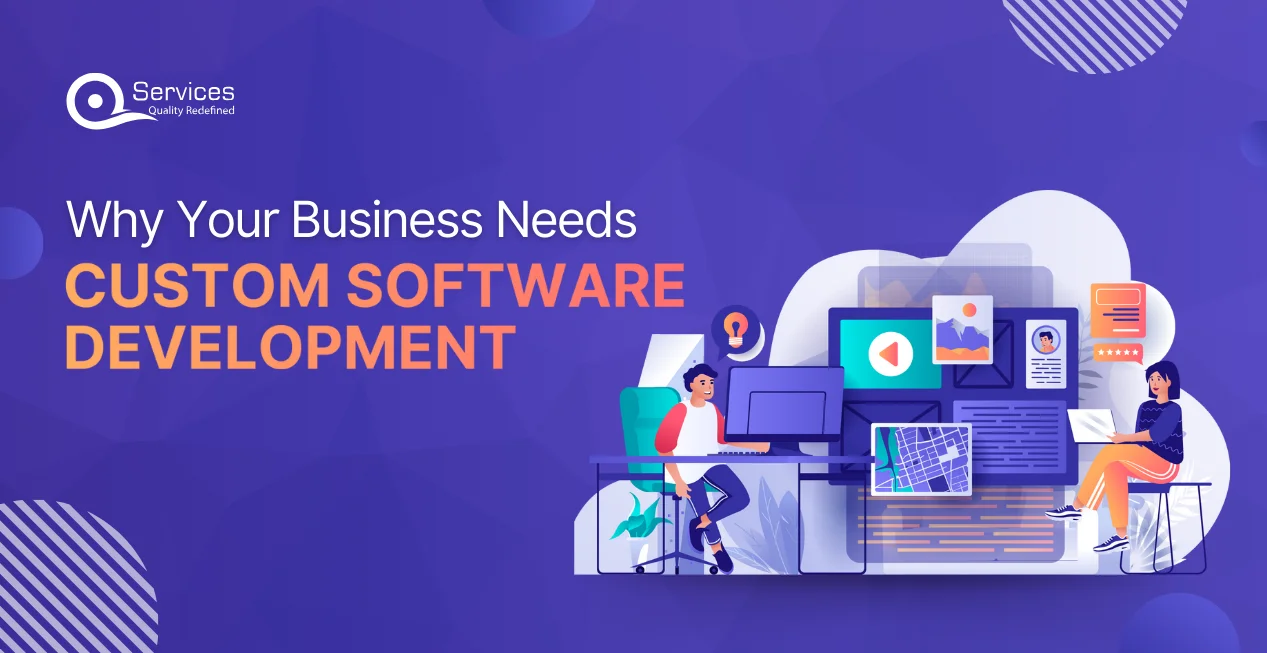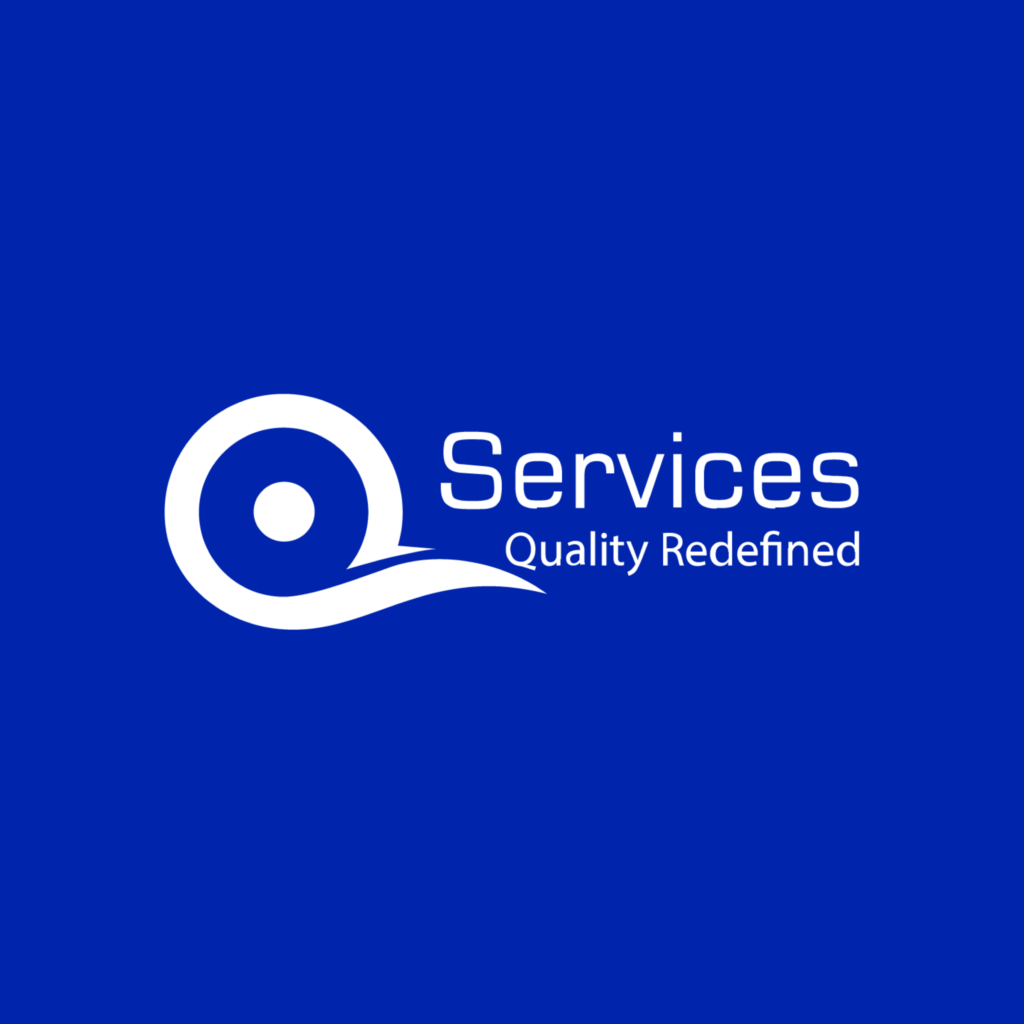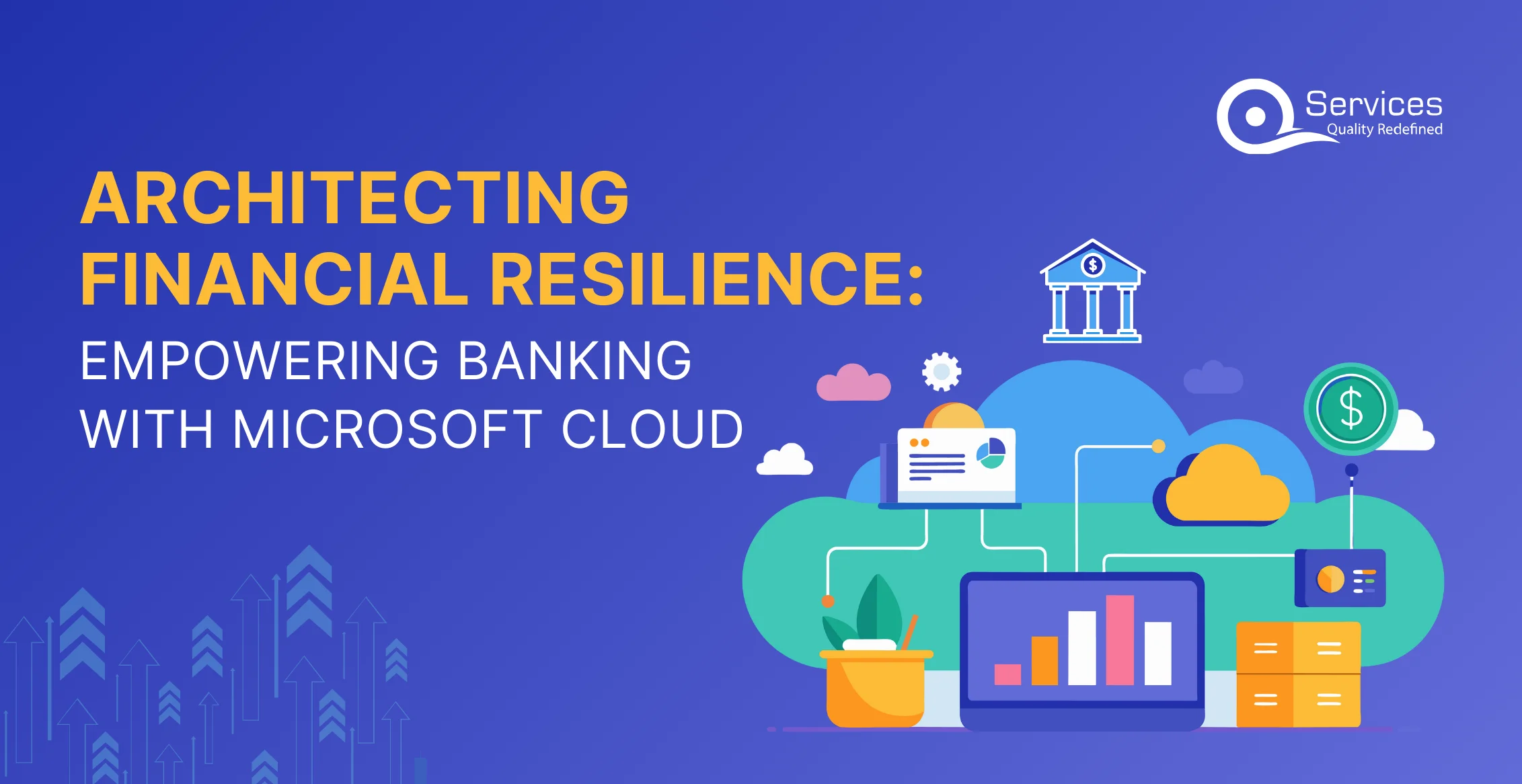
Rewards
.





CANADA
55 Village Center Place, Suite 307 Bldg 4287,
Mississauga ON L4Z 1V9, Canada
Certified Members:
.



Home » Why Your Business Needs Custom Software Development ?

Businesses often struggle with deciding whether to buy ready-made software or develop custom software. While buying software is usually cheaper upfront, it often doesn’t fit properly with their business requirements. On the other hand, custom software is specifically designed for achieving business goals. It can grow along with your business. Although it might be costly initially, one could not overlook its long-term benefits. A report shows that businesses investing in custom software development grow their revenue by 20%.
Intrigued to know what magic it can do to your business? You are at the right place.
This guide will explain why businesses should invest in custom software development.
Bespoke software development is the process of creating, deploying, and maintaining software based on specific business needs. Unlike ready-made commercial software which are designed for a broad audience with generalized features. Custom software is built to fulfil the unique requirements and workflows.
As Steve Jobs once said,
Design is not merely what it looks like and feels like. Design is how it works.
Custom software embodies the same philosophy by focusing on functionality that fits seamlessly with the business’s operations.
Custom software solutions and ready-made software solutions differ from each other because of their adaptability and specificity. Readymade ones provide a cheaper initial setup, but it requires businesses to adapt their processes to fit the software, which can lead to several limitations.
In contrast to tailored software solutions, the software is designed to grow and evolve along with the business, providing both scalable and flexible business solutions. Custom software development ensures that the technology enhances, rather than hinders, business operations.
Get free Consultation and let us know your project idea to turn into an amazing digital product.
Businesses are constantly finding ways to improve their operational efficiency and enhance customer experience, that make them to stay ahead in the competition. Custom software development services are the most effective strategies to achieve business goals. According to a study by GoodFirms, 61% of businesses find that custom software development helps them achieve their business goals more effectively. Let’s discuss what solutions it can provide to businesses.
Custom software is designed to address the specific requirements of a business to ensure that all functionalities align perfectly with the business processes.
For instance, consider a software development company that might need a custom project management tool that integrates effortlessly with their existing development environments, tracks project records in real time, and along with that provides detailed analytics on team performance. This approach eliminates the limitations and inefficiencies often associated with generic software.
As businesses grow, their software requirements also grow simultaneously. Suppose a logistics company might need custom application development to address its unique operational challenges. Custom applications can be tailored to manage complex logistics processes such as route planning, real time tracking of shipments, automated scheduling of deliveries, and predictive maintenance.
To integrate effortlessly with existing systems is the most significant capability of custom software. For example, a financial services company might need custom software integration to connect their customer relationship management (CRM) system with loan processing and risk management systems.
This custom software integration ensures that data flows effortlessly between different departments, reducing errors and improving decision-making. By having a unified system, the company can streamline operations, enhance data accuracy, and provide better service to their clients.
Custom software development allows businesses to implement security measures tailored to their specific needs. This is very important for the industries that deal with handling sensitive data, such as finance and healthcare. For example. A fintech company might require custom encryption protocols and multi factor authentication to protect customer data.
Custom software designed to comply with industry-specific regulations, ensuring that businesses meet all legal requirements. A study by IBM found that companies with fully deployed security automation save an average of $3.58 million per data breach.
Although custom software may initially cost more than ready-made commercial software, in the long run, it can save money and be advantageous to a business. Companies can get rid of the recurrent licensing costs connected to ready-made software solutions.
For example, a manufacturing company can invest in a custom enterprise software development solution like an ERP system that consolidates various functions such as production scheduling, inventory management, and financial reporting of the company operations.
Custom software offers unique features and functionalities that set a business apart from its competitors. For instance, an e-commerce company might develop a custom recommendation engine that uses advanced algorithms to personalize product suggestions for each customer. This experience can lead to higher customer satisfaction and enhanced sales.
A survey by Accenture found that around 91% of customers shop with companies that provide personalized recommendations and relevant offers, and that can be more likely to be possible with custom software solutions.
Identifying the need for custom software development is important for a business’s growth and its operational efficiency. Here are some signs that indicate that it’s time to consider a custom software to your business.
If your current software no longer meets your business-specific needs or lacks the flexibility to adapt to your growing operations, it’s a clear sign that custom software might be necessary.
If you find yourself constantly coming up with workarounds or doing things manually because your current software just can’t keep up, it’s a sign that it’s not really supporting your business. Think of it like trying to use a spoon to dig a hole – it works, but it’s not the best tool for the job.
Custom software solutions are here to help you with providing specific solutions that fit to your exact needs, making everything run smoother and more efficiently.
If your different software systems don’t work well together, you end up with data stuck in separate places and poor communication between systems. This can lead to data silos, where information is isolated and not accessible easily across the organization, causing delays and miscommunication. A custom solution can bring all your systems together, ensuring everything works seamlessly. This unified approach can improve data flow, enhance collaboration, and provide a comprehensive view of your operations.
Every business has its own way of doing things, and sometimes ready-made software just can’t handle these unique processes.
If your business has specific needs that generic software can’t accommodate, custom software is the way to go.
Custom software can provide solutions that can support your specific workflows, ensuring that your business processes are optimized and not constrained by the limitations of generic solutions.
Generic software might not be able to address your specific requirements if the business you work for handles sensitive data, such as the healthcare industry, where keeping track of patient records is a very private task that needs the highest level of security. The security requirements of various businesses vary, and commercial software might not offer the necessary level of protection.
Enhanced security features, such multi-factor authentication, advanced encryption, and compliance with industry rules, can be specifically incorporated into custom software to meet your needs. By doing this, you may be confident that your data is secure and prevent expensive security breaches.
Selecting the right custom software development company is most important for the success of your custom software project. Here’s a simple guide to help businesses make the best choice:
Make sure the company has strong technical skills in the technologies you need. It should be well updated with the latest programming languages and tools.
Select a company that has experience in your industry. This means they understand your specific challenges and can provide better solutions.
Look at the company’s past work. Their portfolio and case studies will show you what they’re capable of and the types of projects they’ve successfully completed.
Check what their previous clients have to say about themselves. Positive feedback often ensures the company’s reliability and performance.
Good communication is key. Ensure the company is responsive and clear in their communication process.
Understand how they manage projects. Whatever technology they use, make sure their approach toward projects should be aligned as per your needs, ensuring timely delivery.
While cost is important, it shouldn’t be the only factor. Look for a company that offers a good balance between quality and affordability. Make sure their pricing is transparent with no hidden costs.
Post-launch support is crucial. Ensure the company offers reliable support and maintenance services to keep your software running smoothly.
Experience and expertise are vital for several reasons:
Problem-Solving Skills: Experienced developers often deal with many challenges and are aware of the possible solution of that challenge. They can anticipate issues and address them before they become problems.
Quality Assurance: Companies with a good track record are more likely to deliver high-quality software. They have established processes for testing and quality assurance.
Efficiency and Speed: Experienced teams work more efficiently, reducing the time needed to develop and deploy your software. They follow best practices and industry standards.
Innovation: Experts in the latest technologies can offer advanced solutions that provide a competitive edge to your business. They use new tools and techniques to enhance your software’s functionality and performance.
You can choose the right software development company considering these factors that meet your technical needs and align with your business goals.
Developing custom software might sound like a big task, but breaking it down into simple, manageable steps can make the process much smoother. Here’s a casual guide to help you understand the journey from idea to launch.
The custom software development lifecycle is like a roadmap that guides you from the initial idea to the final product and beyond. It ensures that every step is planned and executed systematically, so you end up with software that fits your needs perfectly. Here’s a detailed look at each stage, explained in an easy-to-understand way.
The first step is to determine what you want the software to accomplish. This is the most important stage in the planning process, including gathering requirements, conducting some research, and developing a project strategy.
For instance, to create a custom inventory management system for your retail firm, you would first need to determine what features you need, such as automated reordering and real-time stock updates. After that, you would define the project’s objectives and scope. Understanding your goals and setting the project’s foundation are the main focuses of this phase.
After the planning, the software’s design and functionality are planned out. Which includes drafting architectural designs, mockups, and wireframes. For example, a logistics company would require intricate wireframes for a unique tool for route planning, including user interfaces for scheduling and real-time tracking. This ensures that every functionality is thoroughly thought out before development starts.
Now it’s time to build the software according to the design. This involves writing code, integrating components, and developing features. For example, during the development phase, a financial services firm might have developers code a custom CRM system that integrates with their loan processing and risk management systems. This phase is about turning the design into a functional software application.
Once the software is built, you need to make sure it works perfectly. This involves performing various tests, including unit testing, integration testing, and user acceptance testing (UAT).
For example, a healthcare provider, while developing a custom EHR system, should always conduct thorough testing to ensure that the software integrates effectively with billing and lab systems, and that it accurately handles patient data without errors.
After testing, it’s time to launch the software for everyone to use. This involves deploying the software, configuring settings, and training users. For example, when deploying a custom ERP system for a manufacturing company, the deployment phase would involve setting up the software on the company’s servers, configuring it to match their workflows, and training employees on how to use the new system effectively. This stage is about getting the software up and running in the real world.
Lastly, you need to keep the software running effortlessly. This involves monitoring performance, fixing bugs, and implementing updates. For example, after launching a custom recommendation engine for an e-commerce company, the maintenance phase would involve regularly updating the algorithms to improve accuracy and adding new features according to user feedback. Maintenance ensures that the software remains functional and relevant over time.

The world of custom software development is constantly evolving, with various key trends shaping the industry. One major trend is the increasing use of AI and machine learning (ML).
These advanced technologies enable software to automate complex tasks and improve over time without needing constant updates.
Another significant trend is cloud computing. 70% of businesses are moving their operations to the cloud to get benefit of its scalability, flexibility, and cost-effectiveness. Cloud-based custom software allows companies to access their applications from anywhere, making remote work more efficient.
Emerging technologies are also having a profound impact on custom software development. Blockchain technology is utilized to enhance security in diverse industries including finance to supply chain management and many more.
Low-code and no-code platforms are making it easier for businesses to develop custom software without needing extensive coding knowledge.
Looking ahead, the future of custom software development is bright. Internet of Things (IoT) integration is expected to grow, connecting more devices and enabling smarter, more interconnected systems.
Additionally, cybersecurity will continue to be a top priority. As cyber threats become more sophisticated, custom software solutions will need to incorporate advanced security measures to protect sensitive data.
Custom software development offers numerous benefits, including tailored solutions, scalability, seamless integration, enhanced security, and long-term cost-effectiveness. Investing in custom software can improve your business operations significantly, providing a competitive edge and supporting growth. If you’re looking to achieve long-term success, consider exploring custom software solutions. Contact a reputable software development company to discuss your specific needs.
And while you’re at it, don’t miss our next blog on Why ASP.NET Core Development is Essential for Your Growing Business – it’s packed with insights to help you leverage the latest technologies for even greater success!

Our Articles are a precise collection of research and work done throughout our projects as well as our expert Foresight for the upcoming Changes in the IT Industry. We are a premier software and mobile application development firm, catering specifically to small and medium-sized businesses (SMBs). As a Microsoft Certified company, we offer a suite of services encompassing Software and Mobile Application Development, Microsoft Azure, Dynamics 365 CRM, and Microsoft PowerAutomate. Our team, comprising 90 skilled professionals, is dedicated to driving digital and app innovation, ensuring our clients receive top-tier, tailor-made solutions that align with their unique business needs.

When it comes to data security, are you reacting to problems—or preventing them before they happen? With cyberattacks on the rise and regulations constantly evolving, businesses need proactive solutions that do more than just defend—they need tools that empower.

The financial services industry is at a major turning point, driven by rapid digital innovation. Banks and financial institutions are increasingly adopting cloud solutions, not just to save costs, but as a key component of new service delivery models. The cloud’s agility, scalability, and security help banks meet the evolving needs of customers and regulators.

The oil and gas industry uses intricate infrastructure and equipment to extract, process, and transport resources. Keeping these assets reliable and safe is vital for efficient operations. Traditionally, maintenance approaches have been reactive or preventive, often causing unexpected downtime, higher maintenance costs, and safety risks.
Custom software development includes creating software tailored to meet the specific needs of a business.
Custom software is tailored to specific needs, offering better integration, scalability, and security.
The timeline varies based on complexity, but it typically ranges from a few months to over a year.
It can be more costly upfront than off-the-shelf solutions, but it often provides long-term savings and efficiency.
Yes, custom software is designed to integrate seamlessly with your current systems.
Industries like healthcare, finance, logistics, retail, and manufacturing often benefit significantly.
AI can automate tasks, improve decision-making, and enhance user experiences.
Custom software can include tailored security features to meet specific industry regulations and protect sensitive data.
Yes, custom software can be updated and scaled to grow with your business, allowing to add new features and functionalities as per your needs.
Custom software can streamline operations, improve efficiency, and provide a competitive edge by offering solutions tailored to the specific needs of a small business.
Schedule a Customized Consultation. Shape Your Azure Roadmap with Expert Guidance and Strategies Tailored to Your Business Needs.
.





55 Village Center Place, Suite 307 Bldg 4287,
Mississauga ON L4Z 1V9, Canada
.




Founder and CEO

Chief Sales Officer
